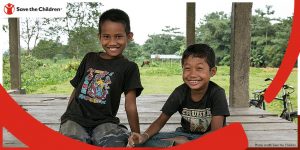Disaster Proof Childhood must be the norm
An International Conference on Early Childhood Development and Emergencies highlighted the need for establishing minimum standards of relief for children affected by disasters, strife or such emergencies.

India, because of its unique geographical location and other circumstances is said to be the third worst affected country by natural disasters since 1995. This has a major impact on the children and their early childhood development.
In this backdrop, the ‘4th International Conference on Early Childhood Development and Emergencies: Way Forward’ was recently organised by Centre for Early Childhood Development and Research (CECDR), Jamia Millia Islamia along with NGO Save the Children, India.
“Saddened to know that we really have limited documentation on the topic of this conference i.e. ECD in Emergencies,” highlighted Prof. Rekha Sharma Sen, Associate Professor of Child Development at Indira Gandhi National Open University (IGNOU).
Early Childhood Development (ECD) is considered as “a comprehensive approach to policies and programs for children, their parents, caregivers and communities from the prenatal period through children’s entry into schools”.
Since children during emergencies are a vulnerable group and children in the age group of 0 to 8 years or more are completely dependent on adults for their survival and well-being, ensuring minimum standards of relief for such children becomes essential.
Also Read: Kerala Floods: Lending a rehabilitative hand
“It time to prioritise early childhood years in case of emergencies, also because comprehensive investments in early childhood years is a long-term investment to the country. The time is to establish minimum standards of relief for young children in emergencies or affected by them,” said Kamal Kishore, Member, National Disaster Management Authority.
The conference held that emergency situations not only directly impact psychology, health and nutrition, and education, there are other overarching indirect impacts on parents, family, and by extension, the society itself.
Even though national policies and systems are in place, since the actual response to any emergency is diverse, it’s necessary to “uphold children’s rights to develop their full cognitive, emotional, social and physical potential”.
The two-day event brought together national and international ECD professionals, last-mile grassroot organisations and practitioners, from UNICEF, NDMA, National Institute of Disaster Management (NIDM), Save the Children, National Institute of Educational Planning and Administration (NUEPA), Ambedkar University Delhi and others who reflected on key thematic areas under ECD in Emergencies.
Bidisha Pillai, CEO Save the Children India added, “Emergency situations exacerbate the problems associated with early childhood development. We need to think hard about the trauma and violence that the child undergoes. We have to start thinking multi-sectoral. While children are at the frontline of the impact of emergencies, they are also in the frontline of the solutions. Therefore, it’s imperative that we also involve them when we look at the way forward.”
India is not only experiencing natural calamities or disasters but endemic strife and violence that have happened in the past in the areas of North East, Jammu and Kashmir etc, as well as Left Wing Extremism (LWE) that has affected childhood and children in many ways. The recent floods in Kerala are an example which left children under the danger of vulnerability and abuse.
‘Protecting children in humanitarian and natural crisis should be the priority by facilitating smooth recovery of young children at the time of emergency,” said Professor Zubair Meenai, Director, CECDR, Jamia Millia Islamia.
The CECDR was established in February 2010 as a unique partnership between Jamia Millia Islamia which is a Central University, and Save the Children India.
Also Read: Disaster funding to States need to be responsive, says Dr. P.K. Mishra
“The vision of CECDR is to see an India in which every young child is provided with a nurturing and stimulating environment for her optimal, holistic development. Towards this, @CECDR1 is engaged in capacity building, research, documentation, networking and advocacy,” read the Twitter handle.
Organised in response to “contextual and systemic challenges” that contribute to low disaster response and management, child protection or right to education, the outcome of the conference is a draft policy brief highlighting the key issues and recommendations aimed at advocacy in the area of ECD and emergencies
